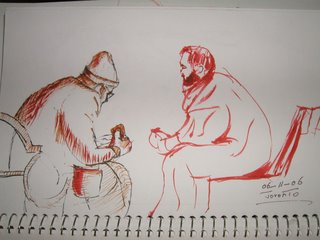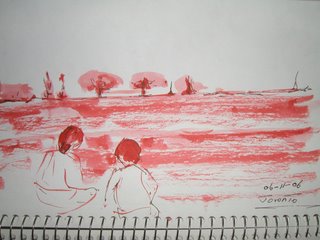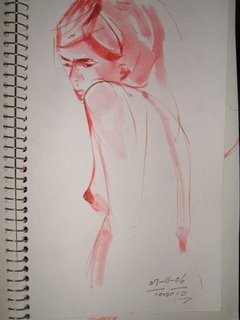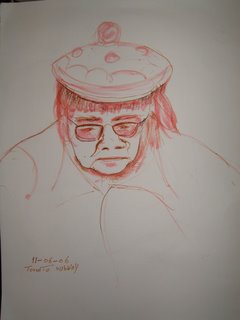skip to main |
skip to sidebar
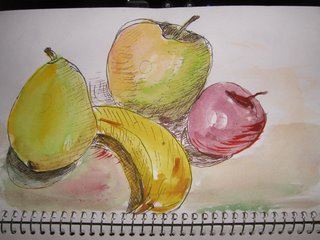
What is a “sketch”?
Browsing old sketch files in Wetcanvas, I ran to a posting by : Katherine Tyrrell, dated Aug. 04 which sounds very interesting and practical for
sketch lovers. You may read the main part of her writing bellow .
"A sketch, in art terms can be a way of practising and refining your skills in drawing and mark marking
* an exploratory drawing – exploring how something works/might work
* a quick drawing – e.g. sketching in public tends to be time-limited rather than open-ended
* a rough description – it’s OK if they lack detail; don’t fill the page or are not even completed
* a record of something you’ve seen
* a record of one or more aspects of something you want to develop into a painting e.g. a colour study
*a preliminary study – for a later painting (done before you start to check how your painting will work rather than as an underdrawing on your final support)A sketch may be an imaginative or a creative interpretation of reference material – but it does not involve meticulous copying of a reference photo.
Very often a sketch is a study of a subject that the artist can see – and consequently involves working and drawing from life. This is the sort of sketch we will focus on in this lesson.
Why sketch?
Sketching broadens and enhances your basic skill base. As you practice and progress, sketching will also help you to: - Develop your freehand drawing, mark making and observational skills
- Draw something everyday – an exercise which will bring fluency and confidence to your drawing
- Get a better record of the colours and tones you see
- Practice how to crop a scene and compose a picture
- Develop finished artwork without relying totally on a reference photo
People who sketch gain value from the following activities:- Practicing freehand drawing skills – tracing reference images and using grids can mean that some artists lose their fluency in freehand drawing skills or fail to develop them at all. Sketching improves freehand drawing. With practice comes fluency and the ability to draw more quickly and make more creative and interesting marks.
- Drawing with minimal aids – when the only drawings aids you have are your pencils and maybe a viewfinder, you soon learn to develop your observational skills. Looking more carefully means you get better at measuring judging by eye alone. You also understand much better ‘how’ a view works – you understand the architectural perspective, the aerial perspective and grasp the recession which often gets flattened in a photograph.
- Ability to see values and colours – unless you are an expert photographer, once you start to sketch and compare your sketch with photos you took at the same time, you will learn very quickly just how poor photographs are at capturing the true range of tonal values that you have seen. In addition, because you learn to look more carefully at colours, you will also begin to understand how most photographs can distort both contrast and colour, particularly on very bright days. Take photographs to record details and check drawing and sketch to get values and colours correct.
- Ability to see ‘pictures’ - Once you start to sketch and practice looking at your environment more, you will start to “see pictures” everywhere you go.
 For many people this marks the point when they know they are beginning to think like an artist. You’ll find you will start using your very own fingers and thumbs to construct a viewfinder to check out potential images to sketch. (Do try to avoid driving the car at the same time!) You will soon find yourself wanting to learn more about about the design and composition of your drawings and paintings. You will want to practice sketching to develop your skills in making choices in this area.
For many people this marks the point when they know they are beginning to think like an artist. You’ll find you will start using your very own fingers and thumbs to construct a viewfinder to check out potential images to sketch. (Do try to avoid driving the car at the same time!) You will soon find yourself wanting to learn more about about the design and composition of your drawings and paintings. You will want to practice sketching to develop your skills in making choices in this area.

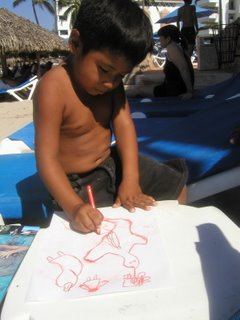
 I met Louis and his younger brother in Puerto Vallarta, Mexico wandering around a beach while their mother was selling mexican hand crafts to tourist. while I was sketching some scenary, I asked him and his brother to come and sit by me. Though they did not know English at all and neither me Spanish, we could communicate very easily. To get them attracted, I handed a paper and pencil to the younger boy to draw. And while he was busy with drawing, I made a sketch of Louis, the older boy.
I met Louis and his younger brother in Puerto Vallarta, Mexico wandering around a beach while their mother was selling mexican hand crafts to tourist. while I was sketching some scenary, I asked him and his brother to come and sit by me. Though they did not know English at all and neither me Spanish, we could communicate very easily. To get them attracted, I handed a paper and pencil to the younger boy to draw. And while he was busy with drawing, I made a sketch of Louis, the older boy.

